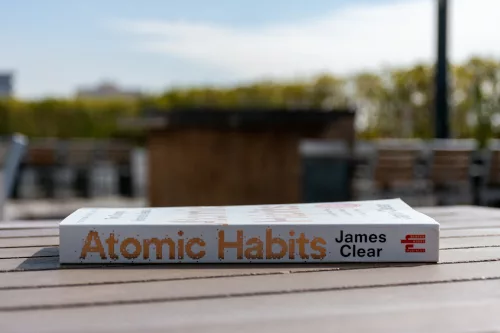
Ditch the Resolutions: Get Your Socks Out The Night Before
 Ok, here we are again. The time of year where gyms are abuzz, salad sales are through the roof, and our commitment to keeping our resolutions has never been stronger. We’re all in, fully committed to our new ‘USs’. We are ready to tackle that marathon, lose 10, okay maybe 20, pounds, read our Bibles daily, write the next great American novel, or swear off using ‘hate’ for things we just don’t like. Man, I hate to think of all my past resolutions that didn’t even make it to February – heck, some didn’t even make it to the second week of January. But when I made them, I really meant them. I know my weight loss goal may have seemed less than sincere as I polished off the last of the Christmas cookies, thinking, ‘The program starts Monday.’
Ok, here we are again. The time of year where gyms are abuzz, salad sales are through the roof, and our commitment to keeping our resolutions has never been stronger. We’re all in, fully committed to our new ‘USs’. We are ready to tackle that marathon, lose 10, okay maybe 20, pounds, read our Bibles daily, write the next great American novel, or swear off using ‘hate’ for things we just don’t like. Man, I hate to think of all my past resolutions that didn’t even make it to February – heck, some didn’t even make it to the second week of January. But when I made them, I really meant them. I know my weight loss goal may have seemed less than sincere as I polished off the last of the Christmas cookies, thinking, ‘The program starts Monday.’
This makes me wonder, is it just me, or do others (you) also struggle to keep these resolutions?
Why do our good intentions seem to have less of a chance of success than last year’s resolution to win the Powerball?
Could it be that we aren’t truly committed? Nah, can’t be that.
So, what is it?
Imagine this: it’s either January 1 or 2, and we’re filled with good intentions and enthusiasm, listing our goals as if we’re writing a letter to Santa. ‘Lose weight,’ ‘read more books,’ watch fewer meaningless YouTube videos,’ and ‘argue less about the Noles being cheated out of the college football playoffs.’ Sounds familiar, right? But here’s the catch: goals are often just the flashy headlines of our aspirations. They don’t offer a step-by-step guide on how to achieve them – like creating a system of how to forgive the CFP for picking two one-loss teams over the undefeated, conference champion Florida State Seminoles.
WAIT! Hold on, that’s not what this blog is about. Let’s refocus: the real deal is this – every goal needs a plan. A systematic approach is essential to turn those New Year dreams into tangible realities.
 This is where James Clear’s ‘Atomic Habits’ really shines for me. It’s the book I find myself gifting most often, and for good reason. Clear’s central idea, simple yet powerful, is to focus on the system rather than the goal. It’s like building a road to your destination, not just staring at the end point on the map.
This is where James Clear’s ‘Atomic Habits’ really shines for me. It’s the book I find myself gifting most often, and for good reason. Clear’s central idea, simple yet powerful, is to focus on the system rather than the goal. It’s like building a road to your destination, not just staring at the end point on the map.
Let me give you a personal example. I once set a goal to walk 1200 miles over a 12-month period, but each day, whether it was Day 1 or Day 17, felt like starting from scratch. My search for excuses to not get up and walk was Olympic level. Sometimes, my alarm would go off and I would lay there, thinking how I didn’t want to get up and get my socks. Talk about setting a low bar! But that inertia was enough to keep me glued to the bed.
The core concept of ‘Atomic Habits’ is simple yet profound: it advises removing any friction points when working towards a goal. The key is to create a ‘System’ that smooths the process. For me, part of that system involved getting my socks out the night before. Voilà! ‘Friction’ removed.
This approach to building my walking system started over three years ago. In the first year, I logged 1275 miles, followed by 1367 in the second, and 1214 in the most recent year. I would call that a success. By focusing on the system rather than the goal itself, I turned something I dreaded into one of my favorite parts of the day.
What ‘systems’ could you set up, or what ‘friction points’ could you remove, to help pave your way to resolution success? The key is to start small, ‘atomic.’ For instance, if your goal is to read more, why not start with a simple system: read a page every night. And if you’re in the same boat as me, aiming to shed a pound or twenty this year, let’s begin with a straightforward step: tracking our calories. Let’s not concern ourselves with the number of calories; instead, let’s focus on the process of tracking them. Who knows? This focus and commitment to an ‘atomic’ habit might just be the spark that leads us to the next step in our success system.
 So, the next question: how do we stay motivated? Well, this is where the principles of behavioral economics can help. It’s often easier to stay committed to smaller, more manageable tasks. Let’s reward our small successes with visual recognition and positive affirmation. Post your streaks. Regularly review your tracking system to identify any gaps. And when there’s a slip-up, It’s OK, remember it is about consistency over perfection.
So, the next question: how do we stay motivated? Well, this is where the principles of behavioral economics can help. It’s often easier to stay committed to smaller, more manageable tasks. Let’s reward our small successes with visual recognition and positive affirmation. Post your streaks. Regularly review your tracking system to identify any gaps. And when there’s a slip-up, It’s OK, remember it is about consistency over perfection.
As James Clear advises, if you miss a day, don’t let it turn into two – just start a new streak! Good luck with your resolutions, and remember, it’s not about the goal of winning the Powerball; it’s about getting your socks out the night before.
Till Next Time!
